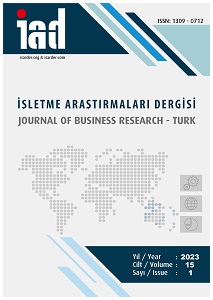Geliştirilmiş Entropi Tabanlı TOPSIS Yöntemiyle İmalat Sektöründe Sürdürülebilirlik Performansı Ölçümü ve Bir Gösterge Seti Önerisi
Sustainability Performance Measurement in Manufacturing Sector with Improved Entropy-Based TOPSIS Method and an Indicator Set Proposal
Author(s): Selda Korga, Ceren DirikSubject(s): Business Economy / Management, Socio-Economic Research
Published by: Orhan Sağçolak
Keywords: Sustainability; Improved Entropy; TOPSIS; Manufacturing Sector;
Summary/Abstract: Purpose – The aim of this study is to propose an indicator set consisting of measurable elements that will help decision makers to include economic, environmental and social dimensions in their sustainability performance evaluations, and to present a diagnostic and action-taking approach in which multi-criteria decision making methods are integrated. Design/Methodology/Approach –The sustainability performances of 12 manufacturing sector companies listed in the Borsa Istanbul (BIST) Sustainability Index for the period 2015-2020 are evaluated with Improved Entropy and TOPSIS methods. Findings – According to the Entropy findings, it is determined that the indicator of the ratio of employees within the scope of collective bargaining agreement has the highest weight and the indicator of energy consumption has the lowest weight in sustainability performance. In terms of the main dimensions of sustainability, it is identified that the highest weight belongs to the social dimension, but the weight of this dimension decreases in 2020. According to the TOPSIS findings, it is specified that companies exhibit a moderate level of sustainability performance, however, there is a decrease in 2020 scores. The robustness of the TOPSIS findings is also confirmed by sensitivity analysis. In addition, a visual map is designed that can assist decision makers in identifying priority areas/indicators for improving sustainability performance. Discussion – It is revealed that there are more differences between companies in terms of the ratio of employees within the scope of collective bargaining agreement at the level of indicators; and in terms of social dimension indicators at the level of dimensions. The decrease in the overall weight of the social dimension in 2020 is considered to be related to the reduction in social indicator differences between companies as a result of the Covid-19 pandemic’s impact. It is evaluated that the decrease in sustainability scores in the same year may be originated from the problems experienced by the companies in the production and/or supply processes and the disruptions in employee training during the pandemic period. Finally, manufacturing sector companies that desire to increase their sustainability performance are recommended to increase the number of their employees within the scope of collective bargaining agreement.
Journal: İşletme Araştırmaları Dergisi
- Issue Year: 15/2023
- Issue No: 1
- Page Range: 561-577
- Page Count: 17
- Language: Turkish

